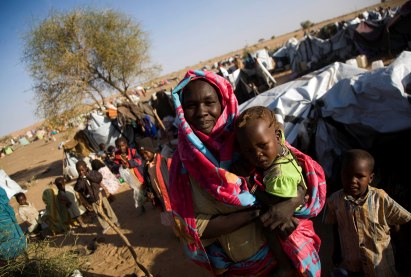Darfur mediators handed bleak assessment in think tank report
By Daniel Van Oudenaren
January 28, 2010 (WASHINGTON) – The think tank Small Arms Survey in a new report casts doubt on the ability of international mediators to achieve the “gargantuan task” of solving the seven-year armed conflict in Darfur, warning against a quick fix akin to the “stillborn” agreement signed in Abuja in 2006. Yet the report stresses the crucial importance of reaching a peace deal before the April 2010 elections.

Small Arms Survey’s latest report examines mediation efforts since May 2006, when the DPA was signed before falling apart amid fighting, backtracking and rebel fragmentation. Since then none of the rebel movements have been eager to pen a deal with the government but consultations are nonetheless moving forward in Doha, Qatar.
“A focus on peacekeeping at the expense of peacemaking, uncoordinated diplomacy, non-transparent mediation, and almost no consultation with Darfurian civil society are among the reasons that peace in Darfur remains elusive,” the Geneva-based think tank stated Thursday in a press release.
Flint contends that the international process on Darfur – involving at various levels American, Egyptian, Libyan, Qatari and United Nations interlocutors – “has become so complicated that disagreements among the P5 (China, France, Russia, the United Kingdom and the United States), within the UN, between the UN and AU, and among Sudan’s neighbours, not to mention the ongoing bitter contests for who controls US policy, have come to consume as much energy as the mediation of the conflict itself.”
“This divided and acrimonious international environment contributes to the Darfurians’ lack of confidence in any mediation process,” she writes. Among other examples, she refers to reported tension between the UN-African Union Joint Chief Mediator Djibril Bassolé and former South African President Thabo Mbeki, who last year headed a new African Union High-Level Panel on Darfur that sought more supervision of the chief mediator.
Referring to disparate Libyan and American-sponsored conferences last year to unite rebel factions, Flint argues that “the international community is being dragged deeper and deeper into micromanagement, and this is not sustainable. Mediators tend to assume that the conflicting parties want to establish a stable ‘normality’ based on a written agreement, but in Darfur today there is so little confidence in any form of normality that the parties are seeking short-term advantage and expecting continuing turmoil.”
Flint also criticizes the international mediators for their lack of transparency.
She advocates a “locally nurtured” peace process that is minimally reliant on foreign mediation. In this context, she places particular stress on civil society involvement, including a “reinvigorated DDDC” — the Darfur-Darfur Dialogue and Consultation. This body was advised by Alex de Waal, with whom she co-authored a book and other writings.
Flint admits, however, that “DDDC failed to live up to the hopes invested in it. It was widely criticized by both Darfurians and donors for being slow to start and erratic in performance and, in the words of one civil society organization, for lacking ‘the vision and the commitment needed to do anything meaningful in Darfur’.”
Mediators this month invited rebel factions to Doha and consulted with them to find common ground in preparation for the negotiations with the government. Sudan’s representatives say they will not negotiate beyond the third week of March due to the approach of the April 11 balloting.
(ST)
The report is available from Small Arms Survey in PDF format at this link: “Rhetoric and Reality: The Failure to Resolve the Darfur Conflict.”
Editor’s note: Julie Flint in response to this piece objected that she never “stridently opposed” the DPA. She wrote, “I supported the DPA, flawed though it was, believing that a peace that is not completely just is better than no peace at all. I wrote this many, many times, and was widely criticized for it at the time. The DPA was doomed however from the moment it did not have the support of the movements.” She also clarified that her opposition to the ICC arrest warrant was due to its timing and the decision to make public application for the warrant.

The Sudanese Soldier/Builder
Darfur mediators handed bleak assessment in think tank report
5000 euro for every Darfurian, OK let’s make a simple calculation 5000 in 7 years war, Southsudan 21 years war, that make it 15000 per “X” millions killed and had to move home + loss of family member + neglected infrastucture ….Wait a second …I do not see any Equality here………………..JEM go to hell with your peace deal, who the hell do you think you are !!?.